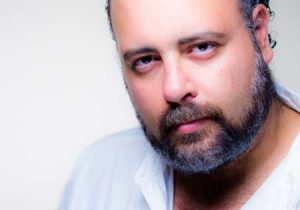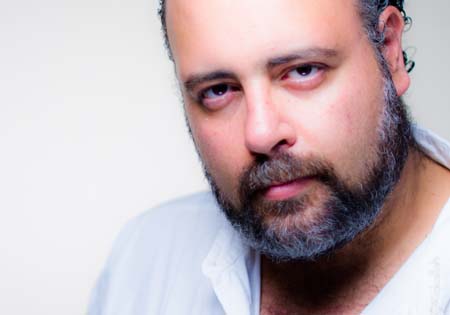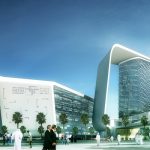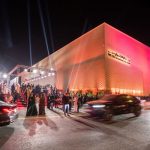Popular Egyptian comedy series Assad Allah Masaoukms director Ramy Rizkallah speaks exclusively to BroadcastPro ME about the award-winning show and his experience of shooting with the Blackmagic Production Camera 4K Assad Allah Masaoukm recently received the Best Comedy Series award in the Middle East. A cross between Late Night with Jimmy Fallon and Saturday Night […]

Popular Egyptian comedy series Assad Allah Masaoukms director Ramy Rizkallah speaks exclusively to BroadcastPro ME about the award-winning show and his experience of shooting with the Blackmagic Production Camera 4K
Assad Allah Masaoukm recently received the Best Comedy Series award in the Middle East. A cross between Late Night with Jimmy Fallon and Saturday Night Live, this Egyptian comedy, hosted by Akram Hosny is broadcast by MBC Masr (Egypt) on Saturday nights. Hosny plays the fictional character Sayed Abo Hafiza in the show.
Each episode of the show combines a topical debate about contemporary culture and politics with comedy sketches and parodies, while also including musical performances and celebrity interviews.
Viewers say this show isnt just about Akram Hosnys talent; it comes packed with gifted and funny young comedians, who bring out the comedy in everyday situations in Egypt.
As we go to press, the last eight episodes of Season 2 of Assad Allah Masaoukm are being shot and are being directed by Ramy Rizkallah, who has been a filmmaker for the last 15 years and well-known for directing the Arab version of Ugly Betty (Heba Regl El Ghorab) for Sony Middle East.
His experience in making comedies was the main reason for being chosen for this job. Rizkallah has been involved in producing the show for MBC Masr since mid last year, when shooting for Season 2 began. A third season is also in the offing although details are still under wraps.
Rizkallah explains that the theme as well as the look and feel of Season 2 is completely different from Season 1, which comprised nine episodes, and went on air in June 2014.
The shows first season focused primarily on the Egyptian presidential elections, he elaborates, adding that he did not direct Season 1.
For the second season, the producers wanted the show to go beyond that. The idea was to take the focus away from only politics and introduce other subjects as well. I was roped in to refresh the show, while keeping the original comic format intact, explains the director.
Upon taking over the reins, Rizkallah decided to give the show a cinematic look. One major aspect of this was to review his camera options. Rizkallah chose four Blackmagic Production Camera 4K systems.
At the time, renting four cameras with a PL mount was too prohibitive, so he devised a system that would work based on a DLSR rig and a set of Carl Zeiss EF primes. The first ten episodes of Season 2 were filmed using four Canon MKIII cameras.
This resulted in a number of frustrations, not least because of the codec limitations and monitoring problems we had on set, so we rented a Blackmagic Production Camera 4K and trialled it on a single segment of the show, explains Rizkallah.
Before switching camera packages, the Assad Allah Masaoukm production team had been limited to monitoring their camera outputs in standard definition (SD) during filming. This was despite producing the footage in HD.
We produce 45 minutes each week, as a director, taking the right decisions fast is crucial and the monitoring option for the MKIII was not up to that, explains Rizkallah.
Here, Rizkallah adds that he has been a loyal Sony user for as long as he can remember.
Sony has been my camera of choice for most of my career, he recalls.
I own an F3 and like working with it. I also worked with DSLRs but realised soon enough that I was not comfortable working with them anymore because of the many limitations in terms of both the monitoring as well as codec limitations. They do offer a reasonable price point though. The BMPC, however, offers better monitoring options, better codec and 4K, plus I could rent it for the same price as the 5D MKIII so the switch was reasonable. I do miss the low-light capabilities of the 5D MKIII sometimes but in production, one must be willing to make compromises.
Rizkallah says the Blackmagic Production Camera 4K is suited to shooting an intensive weekly television talk show format.
But its not a bed of roses when you shoot in 4K, especially in post, Rizkallah cautions. As a result, he doesnt use the camera unless he knows he has the luxury of time to edit in post.
I only shoot 4K though when I know I need the high dynamic range and have the time to edit it as sometimes Im only left with one day to edit the episode, which makes 4K a little bit problematic. So I use ProRes 422HQ in 1080p, 80% of the time.
The prospect of grading the 10-bit rushes was a big draw, explains Rizkallah.
Assad Allah Masaoukm is, for the most part, shot and delivered in ProRes 422 HQ, with the production team relying on 4K CinemaDNG RAW as and when they know a shot or segment will require additional work in post.
We discovered that shooting in ProRes took down our conversion time, as we edit primarily in Final Cut Pro 7. We were so pleased with the results that for the next episode, we switched to filming the entire production with Blackmagics Production Camera 4K. What I like most about the Blackmagic camera is the soft, natural looking facial tones you get from the large Super35mm sensor. Based on comparisons, we were confident, that, with the right lighting, we could achieve really good facial tones.
My Director of Photography (DoP), Joseph Louis, prefers indirect lighting, so everything on the show is either filtered or bounced off a white source. This is how we light our show except in cases where we might be parodying an old soap opera or film, and then we use the lighting style of that specific genre or time. We also had to make use of an IRND filter in order to shoot at wider aperture outdoors, which stopped our blacks from getting too muddy, and allowed us to maintain a shallow depth of field.
Rizkallah elaborates on how the camera was also put to good use to shoot a music video spoof, as part of the series, that was filmed as one continuous shot from the beginning to the end.
Due to time constraints, we knew that shooting might not happen at the most ideal time of day. Knowing this early on, I agreed with our DoP to shoot the segment in CinemaDNG RAW. The 12 stops of dynamic range then allowed us to get the highlights down in the grade, using DaVinci Resolve, showing the beautiful sky whilst not losing any of the detail and facial tones in the performers face. We only had 48 hours for the edit and digital intermediate (DI), so masking and tracking in post just werent an option. We were both impressed by the end result.
The Production Camera 4K is a camera thats geared towards a weekly, intensive production such as ours its a real workhorse, and the 10-bit ProRes format combined with the dynamic range are amazing. We are also now more confident about what we are shooting because we get better, more consistent monitoring using a single BNC cable, which is a more production-orientated connection, and allows us to use professional SDI-based monitoring solutions, explains Ramy.
Each format comes with its own set of challenges, according to the director. The same has been true for Assad Allah Masaoukm. Coming up with new ideas that are funny, current and family- friendly is certainly not a cakewalk. Planning new ideas keeps the team constantly on its toes but so does the sheer volume of content that is produced each week.
We have an amazing team of writers; trying to come up with new visual ways to tell the story is a huge challenge. Shooting music videos, which is also part of producing Assad Allah Masaoukm every week, is a nightmare. Sometimes, owing to budget and time limitations, we are forced to shoot 50 minutes of the show in one day, which makes us work ridiculous hours. We have a record of working for 25 consecutive hours! Handling those volumes of work is challenging but rewarding, nevertheless.
Most of this reality show was shot at Cairo Media City, 6th of October district and in MBCs studios in Egypt. The show has garnered viewer interest not just in Egypt but across the Arab world.
Egyptian dialect is understood all over the Middle East and the topics that we cover are identifiable across a wide spectrum of viewers. Comedy is a very well received genre and transcends boundaries. Although we are an all-Egyptian team, our brand of comedy is popular across all Arabic-speaking audiences.
The shows host, Akram Hosny, is one of the most talented, creative comedians that you can ever meet in your life. We have another season in the works but unfortunately I’m not at liberty to talk about it yet. All I can say is that will be completely different, promises Rizkallah.
















































































